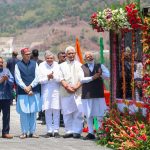 Since Narendra Modi took over reigns in New Delhi as the new Prime Minister, it has been expected that India-Israel relations would move closer and to a new level. It was because Modi, as the chief minister of Gujarat, had worked closely with Israel on complex projects, including in fields such as water and agriculture. Israeli Port Cooperation is one of partners in building the port at Nargol in Gujarat.
Since Narendra Modi took over reigns in New Delhi as the new Prime Minister, it has been expected that India-Israel relations would move closer and to a new level. It was because Modi, as the chief minister of Gujarat, had worked closely with Israel on complex projects, including in fields such as water and agriculture. Israeli Port Cooperation is one of partners in building the port at Nargol in Gujarat.
Now, Israel is the second-largest military partner of India after Russia while for Israel, India is the largest customer of its military equipment. As of 2009, the military business between the two nations is worth around US$9 billion.
After Modi won the recent general elections decisively, Israel’s premier Benjamin Netanyahu told his cabinet that “I spoke with the Prime Minister-elect of India. There, too, there is a clear expression of the desire to deepen and develop economic ties with the State of Israel.”
So, it was natural that the relations were expected to take off to another level after Modi took over, by de-linking the ties from domestic politics and traditional ties with the Arab world.
However, Israel’s on-going offensive against the Hamas in Gaza, which has killed over two hundred Palestinians, has compelled the Indian government to adopt a nuanced stance towards the conflict. New Delhi’s ’balancing act’ between Israel and Palestine reflects not only India’s interests but also the political transformations that have eroded the old security order of the region.
The disproportionate exchange of airstrikes and rocket attacks between Israeli forces and Hamas respectively elicited a restrained response from the India’s Ministry of External Affairs (MEA). The MEA expressed concern at the “escalation of violence between Israel and Palestine, particularly heavy air strikes in Gaza, resulting in tragic loss of civilian lives and heavy damage to property”.
Seen as striking a balance between its prime trade partner of military hardware and counter-terrorism cooperation – Israel – and the largest source of India’s hydrocarbon requirements – the Gulf – India also stated that it is “alarmed at the cross-border provocations resulting from rocket attacks (by Hamas) against targets in parts of Israel”.
India’s response has met with criticism from domestic political actors, the Congress, Trinamool Congress and the People’s Democratic Party, who demanded in Parliament that the government condemn Israeli for its raids over the 40 km Gaza strip stretch. Parliamentary Affairs Minister Venkaiah Naidu, however, stated that “domestic politics should not affect our foreign policy” and the government should not adopt any stance that could have larger implications.
Despite the uproar in Parliament, the Modi administration’s refusal to condemn Israel suggests an almost imperceptible shift in India’s posture towards the Israel-Palestine conflict. In November 2012, the Congress-led UPA government conceded that Israel’s “disproportionate use of force” against Gaza was “excessive” and “unacceptable” after it was criticised for its tepid response to Israel’s offensive.
India has maintained its commitment to the creation of a sovereign state of Palestine alongside Israel, based on the 1967 borders with East Jerusalem as the capital. As reiterated in the Sixth BRICS Summit – Fortaleza Declaration, India opposes the construction and expansion of Israeli settlements in the Occupied Palestinian Territories and has called for a resolution to the crisis in accordance with UN resolutions, the Madrid Principles and the Arab Peace Initiative.
New Delhi’s stance towards the ’Palestinian question’ has evolved against the backdrop of India’s partition, its demographic composition, efforts to counter Islamabad’s influence among Arab nations, and on-going dispute with Pakistan over Kashmir.
Moreover, as a founding member of the Non-Aligned Movement, India’s relations with Tel Aviv were affected by Israel’s invasion of Sinai in 1956, and the Arab-Israeli wars of 1967 and 1973. However, the end of the Cold War and India’s economic liberalisation led both countries to establish full diplomatic relations in 1992 andcreated space for deeper ties. With counter-terrorism and military cooperation as the hallmark of Indo-Israel relations, collaboration has expanded to include pharmaceuticals, agriculture technologies, solar power and space research.
India’s approach to the conflict has, thus, been traditionally shaped by historical imperatives, domestic politics and economic interactions with Israel and Palestine. However, the structural changes taking place in the West Asian region as a whole call for India to adapt its foreign policy to these political transitions. The muted response to the Gaza crisis from the Gulf States — Egypt, Turkey and Iran — is symptomatic of the shifting power relations in the region.
Tehran’s resurgence as a regional actor, following a breakthrough in the US-Iran nuclear stand-off, and the collapse of Hosni Mubarak’s government in Egypt created space for Saudi Arabia and Israel to recognise common interests. Israel, Saudi Arabia and newly-elected Fattah el-Sisi’s Egyptian government see political advantage in the weakening position of the Muslim Brotherhood and its offshoot, Hamas. Both movements have been politically and economically undermined since the Mohammed Morsi-led Muslim Brotherhood government was removed from power last year and Qatar was pressured by the GCC to reduce support for the Brotherhood.
James Dorsey, Senior Fellow at the RSIS Singapore, quotes General Amos Gilad of the Israeli Defence Ministry as stating that Israel’s “security cooperation with the Gulf States is unique….relations with Egypt have improved dramatically since last year’s coup against President Morsi”. Given that even the regional powers have tempered their approach to the Israel-Palestine conflict in the interest of pragmatism, New Delhi sees little merit in adopting an assertive stance towards the internal policies of Israel and Palestine. The West Asian region’s critical significance to India’s energy and economic interests has placed friendly regimes at the centre of New Delhi’s strategic calculus. The ’Arab Awakening’ has ushered the region into a new era that can no longer be viewed through a binary lens of Israel vs. Arab States.
Political turmoil and regime instability have altered the relevance of existing alliances and axes which implies that India’s approach to the Israel-Palestine conflict need not be guided by zero sum calculations. However, this does not negate the importance of balancing Israel and Palestine in foreign policy objectives. As the power and appeal of Islamist insurgencies spreads beyond West Asia, India’s demographic realities necessitate a calculated approach to the Palestinian issue.
The views expressed in this article are solely those of the author.
(Courtesy: ORF)
Author Profile
- India Writes Network (www.indiawrites.org) is an emerging think tank and a media-publishing company focused on international affairs & the India Story. Centre for Global India Insights is the research arm of India Writes Network. To subscribe to India and the World, write to editor@indiawrites.org. A venture of TGII Media Private Limited, a leading media, publishing and consultancy company, IWN has carved a niche for balanced and exhaustive reporting and analysis of international affairs. Eminent personalities, politicians, diplomats, authors, strategy gurus and news-makers have contributed to India Writes Network, as also “India and the World,” a magazine focused on global affairs.
Latest entries
 DiplomacyOctober 4, 2025UNGA Resolution 2758 Must Not Be Distorted, One-China Principle Brooks No Challenge
DiplomacyOctober 4, 2025UNGA Resolution 2758 Must Not Be Distorted, One-China Principle Brooks No Challenge India and the WorldJuly 26, 2025MPs, diplomats laud Operation Sindoor, call for national unity to combat Pakistan-sponsored terror
India and the WorldJuly 26, 2025MPs, diplomats laud Operation Sindoor, call for national unity to combat Pakistan-sponsored terror India and the WorldJuly 25, 2025When Fire Ends, Diplomacy Begins
India and the WorldJuly 25, 2025When Fire Ends, Diplomacy Begins India and the WorldJuly 16, 2025Operation Sindoor and its Aftermath: India’s Successful Diplomatic Outreach
India and the WorldJuly 16, 2025Operation Sindoor and its Aftermath: India’s Successful Diplomatic Outreach







